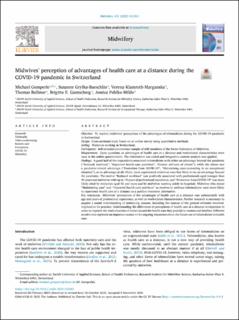Please use this identifier to cite or link to this item:
https://doi.org/10.21256/zhaw-23673Full metadata record
| DC Field | Value | Language |
|---|---|---|
| dc.contributor.author | Gemperle, Michael | - |
| dc.contributor.author | Grylka-Baeschlin, Susanne | - |
| dc.contributor.author | Klamroth-Marganska, Verena | - |
| dc.contributor.author | Ballmer, Thomas | - |
| dc.contributor.author | Gantschnig, Brigitte E. | - |
| dc.contributor.author | Pehlke-Milde, Jessica | - |
| dc.date.accessioned | 2021-12-08T15:56:11Z | - |
| dc.date.available | 2021-12-08T15:56:11Z | - |
| dc.date.issued | 2022-02 | - |
| dc.identifier.issn | 0266-6138 | de_CH |
| dc.identifier.issn | 1532-3099 | de_CH |
| dc.identifier.uri | https://digitalcollection.zhaw.ch/handle/11475/23673 | - |
| dc.description.abstract | Objective: To explore midwives' perceptions of the advantages of telemedicine during the COVID-19 pandemic in Switzerland. Design: Cross-sectional study based on an online survey using quantitative methods. Setting: Midwives working in Switzerland. Participants: Self-selected convenience sample of 630 members of the Swiss Federation of Midwives. Measurement Open questions on advantages of health care at a distance and workrelated characteristics were used in the online questionnaire. The information was coded and integrative content analysis was applied. Findings: A good half of the respondents associated telemedicine with either an advantage beyond the pandemic (“Reduced workload”, “Improved health care provision”, “Greater self-care of clients”), while the others saw a pandemic-related advantage (“Protection from COVID-19”, “Maintaining care/counseling in an exceptional situation”), or no advantage at all. Older, more experienced midwives were less likely to see an advantage beyond the pandemic. The motive “Reduced workload” was positively associated with professionals aged younger than 40 years and midwives with up to 14 years of professional experience, and “Protection from COVID-19” was more likely cited by midwives aged 50 and more and by midwives working solely in hospitals. Midwives who stated “Maintaining care” and “Improved health care provision” as motives to embrace telemedicine were more likely to experience health care at a distance as a positive treatment alternative. Key conclusion: Midwives’ perceptions of the advantages of health care at a distance vary substantially with age and years of professional experience, as well as workrelated characteristics. Further research is necessary to acquire a sound understanding of underlying reasons, including the sources of the general attitudes involved. Implication for practice: Understanding the differences in perceptions of health care at a distance is important in order to improve the work situation of midwives and the health care they provide to women and families. Different sensitivities represent an important source in the ongoing discussion about the future use of telemedicine in health care. | de_CH |
| dc.language.iso | en | de_CH |
| dc.publisher | Elsevier | de_CH |
| dc.relation.ispartof | Midwifery | de_CH |
| dc.rights | http://creativecommons.org/licenses/by/4.0/ | de_CH |
| dc.subject | Telehealth | de_CH |
| dc.subject | Video conferencing | de_CH |
| dc.subject | Remote care | de_CH |
| dc.subject | Perception | de_CH |
| dc.subject | COVID-19 | de_CH |
| dc.subject | Midwifery | de_CH |
| dc.subject.ddc | 618: Geburtsmedizin und Hebammenarbeit | de_CH |
| dc.title | Midwives’ perception of advantages of health care at a distance during the COVID-19 pandemic in Switzerland | de_CH |
| dc.type | Beitrag in wissenschaftlicher Zeitschrift | de_CH |
| dcterms.type | Text | de_CH |
| zhaw.departement | Gesundheit | de_CH |
| zhaw.organisationalunit | Institut für Ergotherapie (IER) | de_CH |
| zhaw.organisationalunit | Institut für Hebammenwissenschaft und reproduktive Gesundheit (IHG) | de_CH |
| dc.identifier.doi | 10.1016/j.midw.2021.103201 | de_CH |
| dc.identifier.doi | 10.21256/zhaw-23673 | - |
| zhaw.funding.eu | No | de_CH |
| zhaw.issue | 103201 | de_CH |
| zhaw.originated.zhaw | Yes | de_CH |
| zhaw.publication.status | publishedVersion | de_CH |
| zhaw.volume | 105 | de_CH |
| zhaw.publication.review | Peer review (Publikation) | de_CH |
| zhaw.funding.zhaw | Digitale Technologien in der Geburtshilfe | de_CH |
| zhaw.funding.zhaw | Chancen und Grenzen bei gesundheitsbezogener Behandlung auf räumlicher Distanz | de_CH |
| zhaw.author.additional | No | de_CH |
| zhaw.display.portrait | Yes | de_CH |
| Appears in collections: | Publikationen Gesundheit | |
Files in This Item:
| File | Description | Size | Format | |
|---|---|---|---|---|
| 2022_Gemperle-etal_Advantages-distance-health-care-COVID19.pdf | 936.66 kB | Adobe PDF |  View/Open |
Show simple item record
Gemperle, M., Grylka-Baeschlin, S., Klamroth-Marganska, V., Ballmer, T., Gantschnig, B. E., & Pehlke-Milde, J. (2022). Midwives’ perception of advantages of health care at a distance during the COVID-19 pandemic in Switzerland. Midwifery, 105(103201). https://doi.org/10.1016/j.midw.2021.103201
Gemperle, M. et al. (2022) ‘Midwives’ perception of advantages of health care at a distance during the COVID-19 pandemic in Switzerland’, Midwifery, 105(103201). Available at: https://doi.org/10.1016/j.midw.2021.103201.
M. Gemperle, S. Grylka-Baeschlin, V. Klamroth-Marganska, T. Ballmer, B. E. Gantschnig, and J. Pehlke-Milde, “Midwives’ perception of advantages of health care at a distance during the COVID-19 pandemic in Switzerland,” Midwifery, vol. 105, no. 103201, Feb. 2022, doi: 10.1016/j.midw.2021.103201.
GEMPERLE, Michael, Susanne GRYLKA-BAESCHLIN, Verena KLAMROTH-MARGANSKA, Thomas BALLMER, Brigitte E. GANTSCHNIG und Jessica PEHLKE-MILDE, 2022. Midwives’ perception of advantages of health care at a distance during the COVID-19 pandemic in Switzerland. Midwifery. Februar 2022. Bd. 105, Nr. 103201. DOI 10.1016/j.midw.2021.103201
Gemperle, Michael, Susanne Grylka-Baeschlin, Verena Klamroth-Marganska, Thomas Ballmer, Brigitte E. Gantschnig, and Jessica Pehlke-Milde. 2022. “Midwives’ Perception of Advantages of Health Care at a Distance during the COVID-19 Pandemic in Switzerland.” Midwifery 105 (103201). https://doi.org/10.1016/j.midw.2021.103201.
Gemperle, Michael, et al. “Midwives’ Perception of Advantages of Health Care at a Distance during the COVID-19 Pandemic in Switzerland.” Midwifery, vol. 105, no. 103201, Feb. 2022, https://doi.org/10.1016/j.midw.2021.103201.
Items in DSpace are protected by copyright, with all rights reserved, unless otherwise indicated.